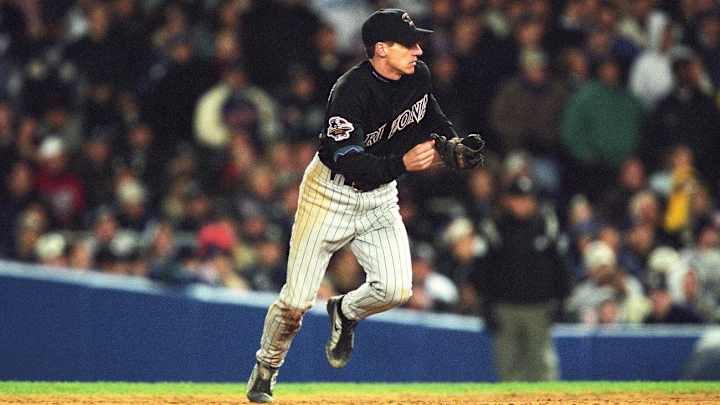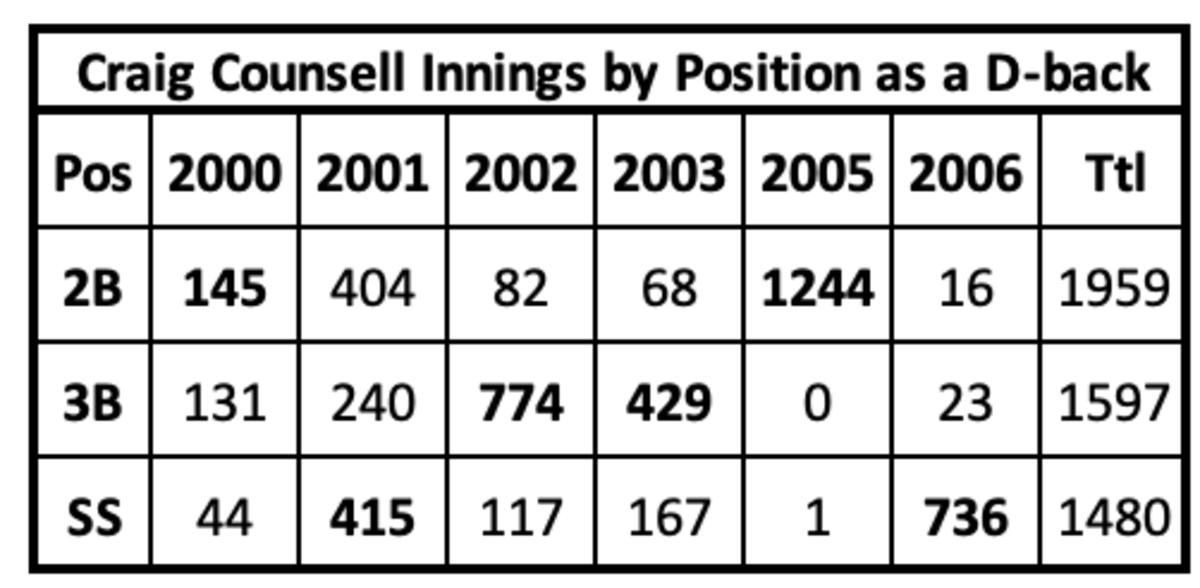Top Diamondbacks Utility Player: Craig Counsell

One of the advantages to being the publisher and editor of this website is I get to do what I want when it comes to content. As I'm working through this series of top three players in Diamondbacks history, I've come across what I refer to as the "Craig Counsell Conundrum." He is without question one of the top four infielders in Diamondbacks franchise history, and it wouldn't be hard to make a case that he's the second best. He posted 12.7 WAR and 4.9 WAA on the strength of a franchise best 87 defensive runs saved. It's notable he posted those defensive runs totals in 224 fewer games than Nick Ahmed played for the D-backs. Ahmed registered 80 rDRS.
The problem is, Counesll doesn't fit neatly into any one positional box. He was the ultimate utility player, a guy his managers could plug into any one of second base, third base, or shortstop, depending on need. In fact that's exactly what they did, as can be seen in the chart below showing his innings played in the field by position by year. So rather than twist my brain into knots trying to figure out where he belongs, I decided to just write a stand-alone article highlighting Counsell's D-backs career as a super utility player.

Counsell was drafted by the Rockies in 1992 out of the University of Notre Dame. He had a cup of coffee in 1995, but didn't really get to play in the majors until 1997. Traded to the Miami Marlins mid season, he hit .299 while playing above average defense in a utility role. He played a key role in that team's postseason run, scoring the winning run in the World Series game 7. That event is chronicled in one of the most heartwarming stories in baseball history, The Chicken Runs at Midnight.
Counsell was traded to the Dodgers in mid 1999 however, and was eventually released by that team very late in spring training 2000. Picked up by the Diamondbacks, he spent the first two months of the year playing for Triple-A Tucson before getting called up on June 2nd to begin his Diamondbacks career. He had the best offensive year as a D-back that year, batting .316 with an .821 OPS in 177 PA filling in as a utility infielder. He showed his penchant for performing in high leverage situations as well, batting 13 for 30, .433 in such situations.
In 2001 Counsell played in 141 games and had 535 plate appearances, filling in all around the infield for manager Bob Brenly, as can be seen in the chart above. He posted 10 defensive runs saved. He hit for a respectable .275 batting average, but his overall OPS+ was just 82. Nonetheless he once again hit well in high leverage, batting .307 with a .408 OBP. Incredibly, he went on to win the NL Championship Series MVP, keying the D-backs victory over the Braves. He batted .381 with a .905 OPS, scoring five runs and driving in 4. Then, in the world series, with the D-backs trailing 1-0 in the bottom of the first in game one, he helped the team make a statement coming up with a clutch homer to tie the game up.
In 2002 and 2003 Counsell spent the majority of his time playing third base, filling in for the oft-injured Matt Williams. He registered double-digit defensive runs saved in both seasons. Traded to the Brewers in the Richie Sexson trade prior to 2004, Counsell returned to the D-backs in 2005, playing a full season at second base and posting a whopping 30 rDRS. In 2006 he was the starting shortstop, but a ribcage injury sent him to the injured list, and Stephen Drew was called up to take over at short. When Counsell returned he was in a brief time share with Drew, but eventually settled back into a utility role to finish out his final season in Arizona.
Hitting above his usual baseline in high leverage situations was something that Counsell did throughout his career as a Diamondback, hitting .311 with a .390 OBP in high leverage. Beyond being "clutch" however, throughout his career with the D-backs he was known for his intelligence and intangibles. He was always in the right place at the right time, making the right play.
He also spent hours sitting on the bench next to his managers, learning that craft as well. After retirement, he became one of the best managers in the game, and was recently signed to a record-setting contract to manage the Chicago Cubs. As a person who is prone to analyze the game through statistics, recognizing my limitations when it comes to scouting, I have no issues with saying that Craig Counsell was a winning player. It was no accident that the teams he played on won championships.
